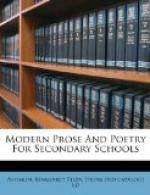=portion of his labor=:—Ecclesiastes, 2:10: “For my heart rejoiced in my labor; and this was my portion of all my labor.”
=the light is sweet=:—Ecclesiastes, 11:7: “Truly the light is sweet, and a pleasant thing it is for the eyes to behold the sun.”
=How long=:—Revelation, 6:10: “How long, O Lord, holy and true, dost thou not judge and avenge our blood on them that dwell on the earth?”
=when the sea=:—Revelation, 20:13: “And the sea gave up the dead which were in it.”
=rejected and despised=:—For this and the remainder of the stanza, see Isaiah, 53.
=Titans=:—In Greek mythology, powerful and troublesome giants.
=Cain=:—See the story of Cain, Genesis, 4:2-16.
=searching like God=:—Genesis, 4:9: “And the Lord said unto Cain, Where is Abel thy brother? And he said, I know not! Am I my brother’s keeper?”
=Temple-vail=:—At the death of Christ, the vail of the temple was rent; see Matthew, 27:51.
SUGGESTIONS FOR STUDY[15]
Read the poem slowly and thoughtfully. The “singing man” is the laborer who, in days gone by, was happy in his work. People were not crowded into great cities, and there was more simple out-door labor than there is now, and less strife for wealth.
Above the vineyards: In Europe, vineyards are often planted on the slopes of hills and mountains. What ancient country do you think of in connection with “the corn [grain], the oil, the wine”? Were the laborers happy in that country? What were the “creatures” of man’s planting (second stanza)? What was the “ancient threat” of deserts? Of what kind of deserts, as described here? Of what deserts would this be true after the rainy season? Laughed to scorn: Does this mean “outdid”? Mentally insert the word something after still in the second line of the third stanza. If the laborer in times gone by did not sing for abundance, what did he sing for (stanza three)? The verses in italics are a kind of refrain, as if the laborer were singing to himself. So is it said and sung refers to the fact that these lines are adapted from passages in the Bible. This last ambush: What does the author mean here by suggesting that the laborer has been entrapped? Who are “they” in the line “‘Enough for him,’ they said”? How did they take away “the corn, the oil, the wine”? How did they take away “the air and the sun”? Who now has the product of the workman’s toil? What are “the eyes of Need”? Is it true that one may work hard and still be in need? If it is true, who is to blame? What are “dim” faces? Why does the author begin the word Man with a capital? What effect does too much hard work have upon the laborer? What is “the crooked air”? Who is represented as saying Why? How does the world forbid the laborer to live? Why are there dotted lines before and




